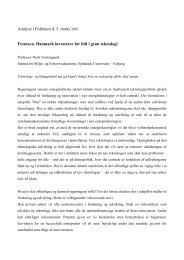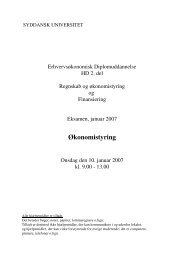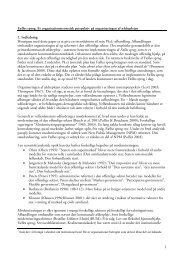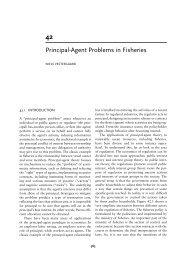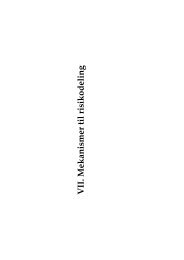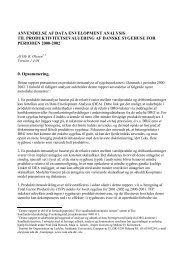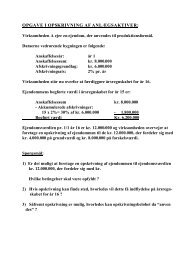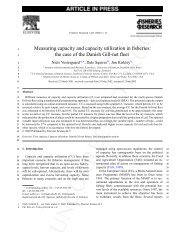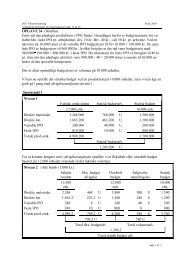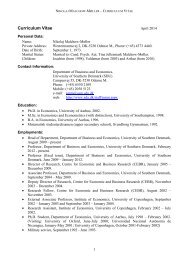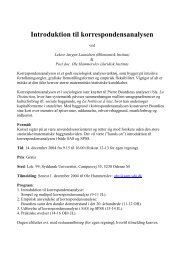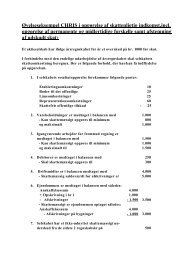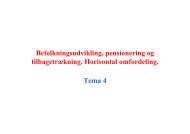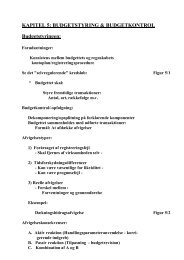F<strong>in</strong>ally, Solidarity can also be considered as a peaceful resistant movement, press<strong>in</strong>g for changeswhose goals was primarily del<strong>in</strong>eated by the <strong>in</strong>telligentsia. As noted by Solidarity’s leader MarianKrzaklewski 42 , Solidarity has mostly been ”aga<strong>in</strong>st” (the old system) <strong>and</strong> called upon universalChristian values <strong>and</strong> traditions go<strong>in</strong>g back <strong>in</strong> Polish history. In the late 1980’s the old trade unionSolidarity speeded up the “cha<strong>in</strong> reaction” end<strong>in</strong>g with the fall <strong>of</strong> the old system <strong>and</strong> the round tabletalks, the semi-free election <strong>in</strong> June 1989, followed by the formation <strong>of</strong> the first non-communistgovernment, the shock-therapy, the economic recession <strong>and</strong> the specific hybrid political capitalism.To conclude, we have to differentiate between• The trade union Solidarity (”S”)• The party movement Solidarity (RS AWS)• The party-coalition Solidarity i.e. AWS, later AWSP, at the foundation <strong>in</strong> 1996 consist<strong>in</strong>g <strong>of</strong>mere than 30 different political groups.Thus we f<strong>in</strong>d at least four different “Solidarity's”, the first from 1980-81, the second undergroundSolidarity from 1981-1989, a third <strong>in</strong> 1988-89 with Solidarity tak<strong>in</strong>g parti <strong>in</strong> the round tablenegotiations followed by the wars <strong>in</strong> the top <strong>and</strong> the first Solidarity led government, <strong>and</strong> the fourthSolidarity act<strong>in</strong>g as an opposition party under the post-communist government <strong>and</strong> after the 1997election as the party <strong>in</strong> power. A fifth stage followed after the defeat at the 2000 presidential <strong>and</strong>2001 parliamentary election.From the 1990s Solidarity had to adapt itself to the new, post-crisis situation, with the uncerta<strong>in</strong>ties<strong>of</strong> the post-<strong>in</strong>dustrial society <strong>and</strong> “extraord<strong>in</strong>ary politics”. As po<strong>in</strong>ted out by Kzryszt<strong>of</strong>Kwasniewicz, Polish experience was a unique <strong>and</strong> exceptional <strong>in</strong> Central East Europe, <strong>and</strong> as such itnot subject to l<strong>in</strong>ear-type regularities. The experience <strong>of</strong> Solidarity can be given a double read<strong>in</strong>g:either <strong>in</strong> terms <strong>of</strong> the regularities underly<strong>in</strong>g its <strong>in</strong>ception, development <strong>and</strong> mechanisms(<strong>in</strong>telligible to the world), or <strong>in</strong> terms <strong>of</strong> the regularities <strong>in</strong> the history <strong>of</strong> the struggle for<strong>in</strong>dependence <strong>and</strong> upris<strong>in</strong>gs (<strong>in</strong>telligible to the Polish nation) (Kwasniewicz, <strong>in</strong> Bäcker etc,2001:172). Before 1989 no observable contradiction existed between the two functions mentionedabove.After the demise <strong>of</strong> the old system Solidarity did not need to “hide itself” beh<strong>in</strong>d a trade unionfacade. The political fight (now aga<strong>in</strong>st the “post-communists”) rema<strong>in</strong>ed an important part <strong>of</strong>Solidarity’s activities, however, the policy <strong>and</strong> programme side were neglected. A de-freez<strong>in</strong>g <strong>and</strong>de-radicalisation took place, but only partly <strong>and</strong> mostly on policy-level. Solidarity leaders soonrecognized that political enemies could be found also <strong>in</strong>side its own camp. In the first stage thepolitical fight took place <strong>in</strong>side Solidarity’s civic committees (”Komitety obywateski ”S””). Thusthe struggle became not only directed aga<strong>in</strong>st the ”post-communists” <strong>and</strong> the trade union OPZZ, butalso between us.42 Interview with Krzaklewski <strong>in</strong> Tygodnik Solidarnosc, 36 (572), 1999:448
The first (semi) free election was most <strong>of</strong> all a referendum for or aga<strong>in</strong>st the old system, not achoice between different political programmes. “Normal” elections were impossible under the firststage <strong>of</strong> extraord<strong>in</strong>ary politics <strong>and</strong> transition anomie. Personalities, not the political orientations <strong>and</strong>ideologies, decided the policy-l<strong>in</strong>e <strong>and</strong> those chosen as m<strong>in</strong>isters <strong>in</strong> the first non-communist ledgovernment.2.3. The first yearsJust after the round table negotiations the civic committees (”Vomited Obywatelski”, OKP) led byLech Walesa was established, <strong>in</strong>clud<strong>in</strong>g representatives from cultural <strong>and</strong> scientific life <strong>and</strong> severalactive dissidents. Under the umbrella <strong>of</strong> OKP 15 different sub-commissions were establisheddeal<strong>in</strong>g with different important socio-economic questions <strong>and</strong> policy formulation. In addition,special commissions were set up deal<strong>in</strong>g with subjects such as trade union pluralism, freedom <strong>of</strong>organisations <strong>and</strong> with political <strong>and</strong> economic reforms. OKP’s organisational structure rem<strong>in</strong>ded us<strong>of</strong> a proto- party consist<strong>in</strong>g <strong>of</strong> a shadow cab<strong>in</strong>et <strong>and</strong> with a broadly formulated political programmethat should make Solidarity ready to take over the government responsibilities when possible <strong>and</strong>feasible.The first Solidarity parliamentary group (OKP) consisted <strong>of</strong> n<strong>in</strong>e different political groups.Formally OKPs organisation worked <strong>in</strong>dependently from the trade union Solidarity. Furthermore,OKP was organized around small groups <strong>of</strong> persons, mostly <strong>in</strong>tellectuals who aimed to create theirown parties.Before the 1989 election Lech Walesa had paved the way for a “systemic shift” propos<strong>in</strong>g agovernment that <strong>in</strong>cluded the two m<strong>in</strong>or post-communist parties, ZSL <strong>and</strong> SD. This self-limit<strong>in</strong>gstrategy would not provoke the leaders <strong>in</strong> Kreml. A humiliation <strong>of</strong> the communists, it was argued,might strengthen the hardl<strong>in</strong>ers <strong>in</strong>side the rul<strong>in</strong>g party (PZPR). Furthermore, the problem about lack<strong>of</strong> comptetent adm<strong>in</strong>istrative leaders recruited from Solidarity was ”solved”, as Solidarity acceptedthat key m<strong>in</strong>istries, such as the M<strong>in</strong>istries <strong>of</strong> Home Affairs <strong>and</strong> Defence, so far were taken over bythe communists.The disagreements <strong>in</strong>side the Solidarity movement were kept down before the first semi-freeelection <strong>in</strong> summer 1989 <strong>and</strong> <strong>in</strong> the first months <strong>of</strong> the rule <strong>of</strong> the Mazowiecki government.Unfortunately, accord<strong>in</strong>g to a big part <strong>of</strong> the electorate, many new Solidarity-leaders showed”euphoric arrogance”. Most new non-communist leaders expected that the people almost withoutreservations would accept the radical changes <strong>in</strong> society – based on the argument that the policy is”good” <strong>and</strong> ”self-evident”. This implied that the significance <strong>of</strong> political <strong>and</strong> economic learn<strong>in</strong>g <strong>and</strong>”socialist m<strong>in</strong>d” was underestimated. Old subjects such as workers’ self-government, workers’councils, co-ownership, strikes <strong>and</strong> demonstrations, all known <strong>in</strong> 1980-81, disappeared from thepolitical agenda <strong>and</strong> was not even discussed after the struggle aga<strong>in</strong>st the old system had been won.It soon became a hot issue, whether Solidarity’s parliamentary group should support the newSolidarity-led government or alternatively be the driv<strong>in</strong>g force <strong>in</strong> a re<strong>in</strong>forced <strong>and</strong> uncompromis<strong>in</strong>gconfrontation with the old system (”przyspieszenie”). Dur<strong>in</strong>g the election campaign <strong>in</strong> 1990 LechWalesa supported the argument that the whole philosophy beh<strong>in</strong>d the round table agreementsshould be ab<strong>and</strong>oned as quickly as possible. He openly supported Solidarity’s privatisation schemebased on “give away schemes” <strong>in</strong> the shape <strong>of</strong> shares given to the whole adult population. However,he still had to strike a balance between the different political groups <strong>in</strong>side the movement as a49
- Page 3: “This provisional situation chara
- Page 6 and 7: marketisation and privatisationshor
- Page 8 and 9: purposes, are channels for “expre
- Page 10 and 11: the significance of strategic choic
- Page 12 and 13: presidentialism gave rise to “flo
- Page 14 and 15: antipolitics and reinforcement of a
- Page 16 and 17: In the late 1990’s elections most
- Page 18 and 19: determined primarily by “politica
- Page 20 and 21: politics and antipolitics, all sign
- Page 22 and 23: which attitudes to state regulation
- Page 24 and 25: Anti-communism has been defined in
- Page 26 and 27: elections and the Slovak communists
- Page 28 and 29: Cartel agreementsbetter representat
- Page 30 and 31: Basically the absence of clear cons
- Page 32 and 33: After 1989 different types of polit
- Page 34 and 35: complex project for transition unde
- Page 36 and 37: window of opportunity in spite of s
- Page 38 and 39: analyses of party institutionalizat
- Page 40 and 41: political messages and slogans. Thu
- Page 42 and 43: well established party culture may
- Page 44 and 45: expected, much due to the many spli
- Page 46 and 47: Furthermore, the polarisation on el
- Page 50 and 51: whole, on the one side an authorita
- Page 52 and 53: The economic recession and the grav
- Page 54 and 55: election defeat more cooperation an
- Page 56 and 57: The formation of AWS can be conside
- Page 58 and 59: group. RS AWS constituted the Chris
- Page 60 and 61: According to the original plans the
- Page 62 and 63: values. According to Rybicki, as so
- Page 64 and 65: AWS should fight against all types
- Page 66 and 67: 2001 parliamentary election, howeve
- Page 68 and 69: and workers voted ZChN. At the 1993
- Page 70 and 71: The League has been considered as a
- Page 72 and 73: establishment like than LPR’s. Th
- Page 74 and 75: jobs in rural areas, especially sma
- Page 76 and 77: industrial policy. According to the
- Page 78 and 79: pressurizing the government to give
- Page 80 and 81: democrats, thereby locating itself
- Page 82 and 83: To conclude, the Freedom Union (UW)
- Page 84 and 85: Polish middle class. Thus, in Janua
- Page 86 and 87: such as KSCM and KSS in The Czech R
- Page 88 and 89: The SLD leaders were mainly recruit
- Page 90 and 91: the falling popular support for pri
- Page 92 and 93: innovation was formation of the pol
- Page 94 and 95: place after talks with each applica
- Page 96 and 97: Has the Left any freedom of manoeuv
- Page 98 and 99:
medicine, changes in the labour cod
- Page 100 and 101:
The Labour Union (UP), Democratic U
- Page 102:
Nevertheless, before that had taken



